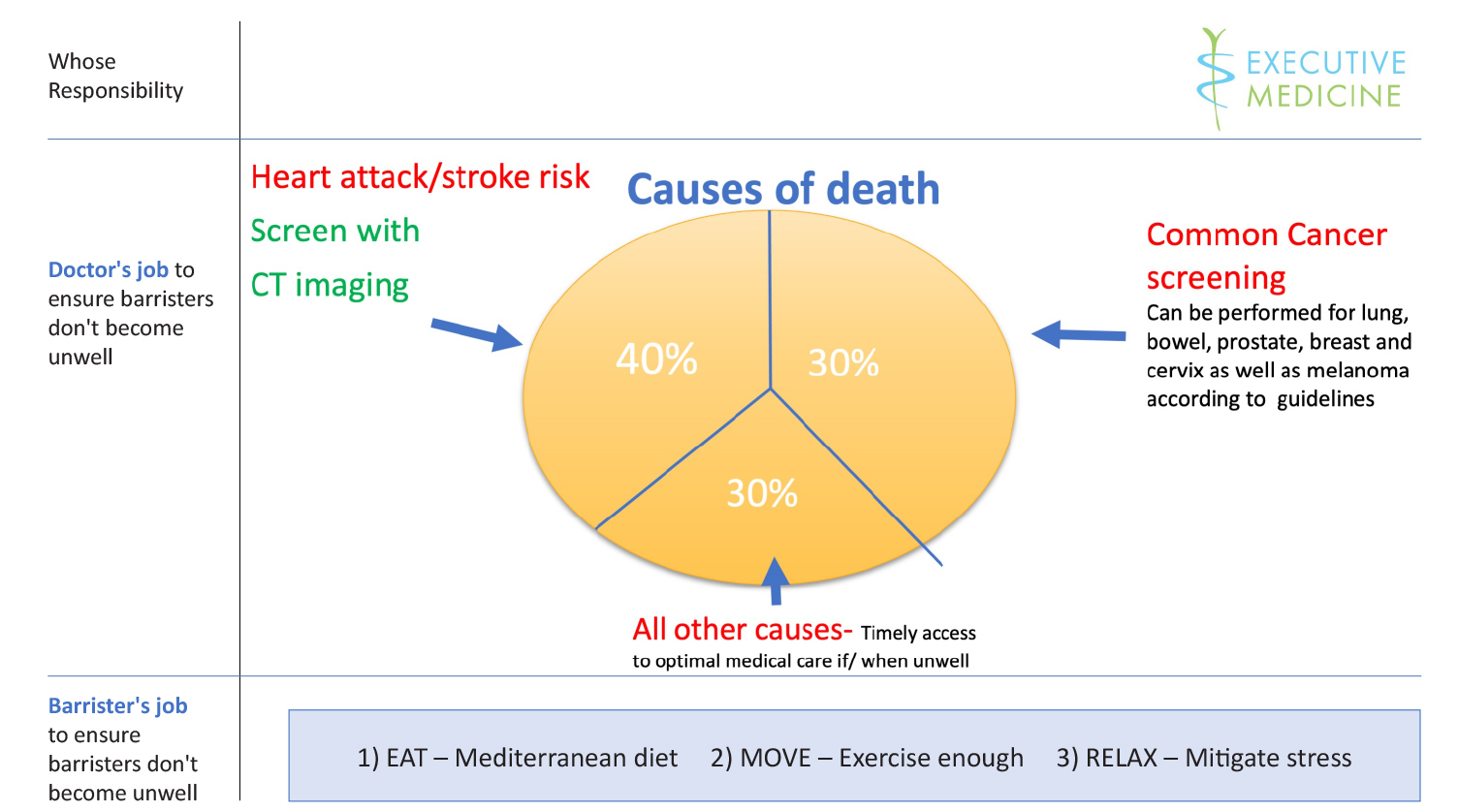Lifestyle choices for better health

B arristers typically work long hours in adversarial environments and often work to extreme deadlines. Barristers, like many other professionals often put the maintenance of their own health on the backburner devoting little time for self-care, thus enhancing their odds of terrible health outcomes such as strokes, cancers and heart disease.
In this article, I answer the following questions: how important are lifestyle choices in avoiding these outcomes? What tangibly can you do, as a barrister, that is simple and effective given your constraints?
The impact of behavioural choices (food choices, sleep, exercise habits etc.) on personal health is huge. These choices predict 80% of health outcomes; while genes explain only 20%.1, 2 For example, for women 95%, and for men 90%, of heart attacks and strokes are attributed to modifiable lifestyle risk factors. 3
Much of my approach at Executive Medicine to longevity and vitality comes from studying those communities with exceptional health – living often to over 100 with bodies that are functioning 20 or 30 years younger than their age. 4
The barristers roadmap for superior health 2021

To achieve this, there are four things to be done:
Firstly, follow a Mediterranean diet which will reduce your risk of heart attack / stroke by a massive 30%. 5 In addition, the Mediterranean diet has other significant benefits such as:
- mitigating your risk of developing bowel cancer (the second most common cancer killer after lung cancer);
- optimising your gut biome (the variety and nature of organisms that are cultivated in our gut, which are integral to great health);
- optimising your brain health in relation to moods, coping with stress and cognitive sharpness.
For any given meal a Mediterranean diet contains:
- 50% plant food with a variety of plant sources and colours;
- 25% healthy protein (white meat such as chicken breast without skin, fish or turkey with red meat avoided, e.g., twice a week if at all); and
- 25% high fibre, including whole grains such as multigrain bread, oats for breakfast, wholemeal spaghetti.
In addition, there should be a small number of nuts and seeds daily, and olive oil.
To do this you will need to set up a system to be organised with your food choices: it’s easier eating food prepared at home and taken to work or understanding (and training your staff) where to buy your food following these principles in your local food court or restaurant.
Secondly, exercise regularly, as high fitness is associated with
- lower risk of all-cause mortality when compared to low fitness; 6
- lower risk of cardiovascular disease; 7 and
- less depression, 8 anxiety, 9 fatigue 10 11 and cognitive impairments. 12
These are critically important for the barrister as 'lawyers consistently rate in the top two occupations with the highest prevalence of mental health problems.' 13 It has been suggested that 'programs of physical exercise should be formally proposed as a preventive measure to people known to be exposed to intense stress (e.g., work-related stress), and could be prescribed as a form of therapy in combination with other treatments to ease mood and cognitive deficits caused by chronic stress'. 14
Your weekly goal should consist of,
at least:
- Two sessions of strength training (using, for example, bodyweight or barbells, or Pilates) – these sessions can be 20-30 mins; and
- either 75 minutes of moderate / high intensity exercise (e.g., jogging, competitive games on a field, singles tennis), or 150 minutes of more moderate exercise (e.g., a brisk walk).
One excellent exercise habit for a busy person could be using an exercise bike at home for 15 minutes a day while watching a movie or listening to an audiobook etc.
Thirdly, you must manage stress which, if left to run rampant, causes among other effects:
- alteration in brain structure increasing one’s risk of psychiatric illness; and
- precipitation of low grade inflammation via the immune system thus promoting such diseases as cardiovascular dysfunction, diabetes, cancer, autoimmune syndromes and mental illnesses such as depression and anxiety disorders. 14
The ‘canary in the coal mine’ indication of excess stress in my view is sleep – if you sleep well (7-8 hours per night) then you are managing life well. It is critical you have regular strategies for ‘dropping’ stress, such as a 10-minute meditation strategy twice a day, and /or an exercise routine plus a healthy attitude and balance in your life such that there is more to your life than just work.
Recognise and address poor ways of managing stress including comfort eating, and alcohol – the latter is indoctrinated in certain occupational cultures including law and is often more mindlessly habitual than physiologically dependant. Excess consumption of alcohol increases the risk of a variety of cancers, including head and neck, esophageal, breast, colon, liver and kidney cancers, 15 and significantly increases the risk of heart and liver disease, and osteoporosis. Even light drinking and binge drinking have a moderate increase of some cancers. Alcohol destroys sleep and strips neurons leading to cognitive decline or even dementia. The ideal level of alcohol consumption is probably zero. Realistically given our cultural alcohol norms I suggest that women have less than 7 standard drinks per week, and that men have at most 10 standard drinks per week. Practise sobriety with alcohol-free days each week as well as more extended periods regularly (one week or one month) in order to give the liver and brain a break.
Fourthly, work with your health provider to sensibly screen for common diseases that are likely to strike without warning.
For heart disease screening consider CT imaging. Only two out of every three people who have heart attacks have chest pain, shortness of breath or feel tired a few days or weeks before the attack. Many have no warning symptoms before their attack. 16
Screening has been a game changer in managing my clients’ risk of heart attacks. With zero calcification (meaning, no evidence of any fatty plaque buildup, which has subsequently calcified, in the coronary arteries) then you have virtually a 15-year mortality warranty for close to zero heart attack / stroke mortality – which is incredibly reassuring. In my view, if you have calcification then your heart attack risk factors need to be managed aggressively by an expert. Typically, I screen the coronary arteries (with a CT scan) of male clients typically at the age of 50, and of female clients typically at the age of 60.
For cancer screening:
- those who are current smokers or have a history of heavy smoking should have a chest CT – lung cancer screening;
- colorectal or bowel cancer can be screened with either stool testing or a colonoscopy;
- prostate cancer can be screened with an annual prostate blood test from the age of 40;
- breast cancer can be screened using mammography (possibly with a breast ultrasound) from the age of 50 in women;
- women should be up to date with Pap smears; and
- finally, you should have a thorough annual physical examination looking for other common cancers such as lymphoma and melanoma.
In my experience, once we educate ourselves on how to eat, how to move and how to manage stress in a positive way, and appropriately screen for common diseases, lives are saved, careers are saved. Guard your health habits carefully – once your health is lost, it often can’t be regained.

ENDNOTES
1 Herskind AM, McGue M, Holm NV, et al. 'The heritability of human longevity: a population-based study of 2872 Danish twin pairs born 1870–1900'.Hum Genet1996; 97:319–23.
2 McGue M, Vaupel JW, Holm N, et al. 'Longevity is moderately heritable in a sample of Danish twins born 1870–1880'.J Gerontol 1993;48:B237–44.
3 Yusuf S, Hawken S, Ounpuu S, Dans T, Avezum A, Lanas F, McQueen M, Budaj A, Pais P, Varigos J, Lisheng L; INTERHEART Study Investigators. 'Effect of potentially modifiable risk factors associated with myocardial infarction in 52 countries (the INTERHEART study): case-control study'.Lancet. 2004 Sep 11-17;364(9438):937-52. doi: 10.1016/S0140-6736(04)17018-9. PMID: 15364185.
4 Buettner, Dan,The Blue Zones Solution, (2015) Little Brown, USA.
5 Ramón Estruch, M.D., Ph. D., Et al., 'Primary Prevention of Cardiovascular Disease with a Mediterranean Diet'.N Engl J Med 2013; 368:1279-1290 .
6 LaMonte M.J., Eisenman, P.A., Adams, T.D., Shultz, B.B., Ainsworth B.E., Yanowitz, F.G (2000) 'Cardiorespiratory Fitness and Coronary Heart Disease Risk Factors'.Circulation; 102: 1623-1628 .
7 Letnes, J.M., Dalen, H., Vesterbekkmo, E.K., Wisløff, U., Nes, B.M (2018) 'Peak oxygen uptake and incident coronary heart disease in a healthy population: the HUNT Fitness Study'.European Heart Journal; 2018 Nov 29. DOI: 10.1093/eurheartj/ehy708. (accessed January 2019).
8 Rethorst CD, Wipfli BM, Landers DM. 'The antidepressive effects of exercise: a meta-analysis of randomized trials'.Sports Med. 2009;39(6):491–511.
9 Wipfli BM, Rethorst CD, Landers DM. 'The anxiolytic effects of exercise: a meta-analysis of randomized trials and dose-response analysis'.J Sport Exerc Psychol. 2008;30(4):392–410.
10 Resnick HE, Carter EA, Aloia M, et al. 'Cross-sectional relationship of reported fatigue to obesity, diet, and physical activity: results from the Third National Health and Nutrition Examination Survey'.J Clin Sleep Med. 2006;2(2):163–9.
11 Theorell-Haglow J, Lindberg E, Janson C. 'What are the important risk factors for daytime sleepiness and fatigue in women?'Sleep. 2006;29(6):751–7.
12 Lautenschlager NT, Cox KL, Flicker L, et al. 'Effect of physical activity on cognitive function in older adults at risk for Alzheimer disease—a randomized trial'.JAMA. 2008;300(9):1027–37.
13 https://www.lawsocietysa.asn.au/LSSA/Lawyers/Publications/Articles/Lawyers_must_be_more_open_about_mental_health.aspx .
14 Mariotti A. 'The effects of chronic stress on health: new insights into the molecular mechanisms of brain-body communication'.Future Sci OA. 2015;1(3):FSO23. Published 2015 Nov 1. doi:10.4155/fso.15.21
15 https://www.cancer.gov/about-cancer/causes-prevention/risk/alcohol/alcohol-fact-sheet .
16 https://www.cedars-sinai.org/health-library/diseases-and-conditions/h/heart-attack-myocardial-infarction.html .